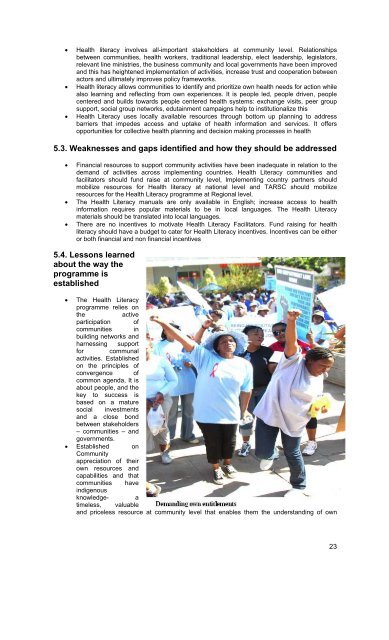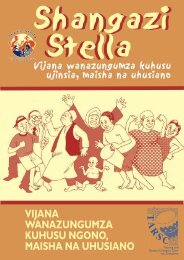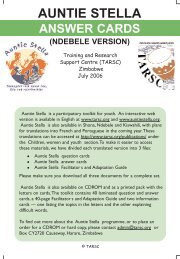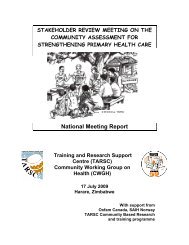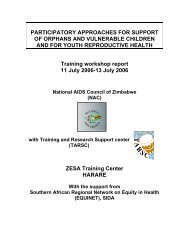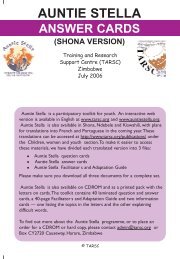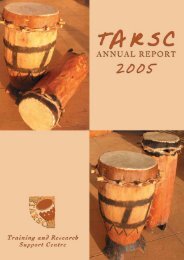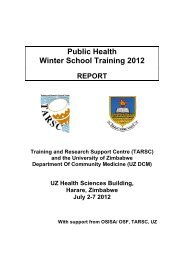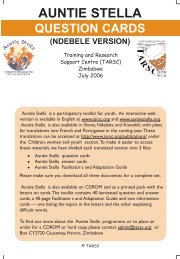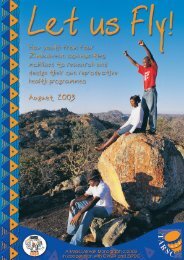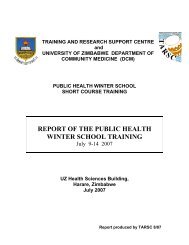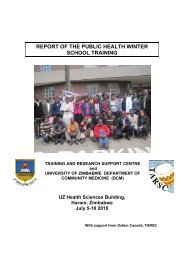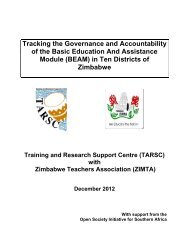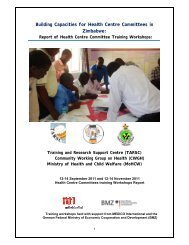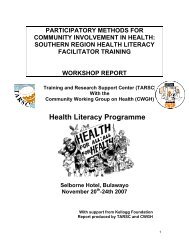HLregional meeting09.pdf - Training and Research Support Centre
HLregional meeting09.pdf - Training and Research Support Centre
HLregional meeting09.pdf - Training and Research Support Centre
You also want an ePaper? Increase the reach of your titles
YUMPU automatically turns print PDFs into web optimized ePapers that Google loves.
• Health literacy involves all-important stakeholders at community level. Relationships<br />
between communities, health workers, traditional leadership, elect leadership, legislators,<br />
relevant line ministries, the business community <strong>and</strong> local governments have been improved<br />
<strong>and</strong> this has heightened implementation of activities, increase trust <strong>and</strong> cooperation between<br />
actors <strong>and</strong> ultimately improves policy frameworks.<br />
• Health literacy allows communities to identify <strong>and</strong> prioritize own health needs for action while<br />
also learning <strong>and</strong> reflecting from own experiences. It is people led, people driven, people<br />
centered <strong>and</strong> builds towards people centered health systems: exchange visits, peer group<br />
support, social group networks, edutainment campaigns help to institutionalize this<br />
• Health Literacy uses locally available resources through bottom up planning to address<br />
barriers that impedes access <strong>and</strong> uptake of health information <strong>and</strong> services. It offers<br />
opportunities for collective health planning <strong>and</strong> decision making processes in health<br />
5.3. Weaknesses <strong>and</strong> gaps identified <strong>and</strong> how they should be addressed<br />
• Financial resources to support community activities have been inadequate in relation to the<br />
dem<strong>and</strong> of activities across implementing countries. Health Literacy communities <strong>and</strong><br />
facilitators should fund raise at community level, Implementing country partners should<br />
mobilize resources for Health literacy at national level <strong>and</strong> TARSC should mobilize<br />
resources for the Health Literacy programme at Regional level.<br />
• The Health Literacy manuals are only available in English; increase access to health<br />
information requires popular materials to be in local languages. The Health Literacy<br />
materials should be translated into local languages.<br />
• There are no incentives to motivate Health Literacy Facilitators. Fund raising for health<br />
literacy should have a budget to cater for Health Literacy incentives. Incentives can be either<br />
or both financial <strong>and</strong> non financial incentives<br />
5.4. Lessons learned<br />
about the way the<br />
programme is<br />
established<br />
• The Health Literacy<br />
programme relies on<br />
the<br />
active<br />
participation of<br />
communities in<br />
building networks <strong>and</strong><br />
harnessing support<br />
for communal<br />
activities. Established<br />
on the principles of<br />
convergence of<br />
common agenda, It is<br />
about people, <strong>and</strong> the<br />
key to success is<br />
based on a mature<br />
social investments<br />
<strong>and</strong> a close bond<br />
between stakeholders<br />
– communities – <strong>and</strong><br />
governments.<br />
• Established on<br />
Community<br />
appreciation of their<br />
own resources <strong>and</strong><br />
capabilities <strong>and</strong> that<br />
communities have<br />
indigenous<br />
knowledge- a<br />
timeless, valuable<br />
<strong>and</strong> priceless resource at community level that enables them the underst<strong>and</strong>ing of own<br />
23


